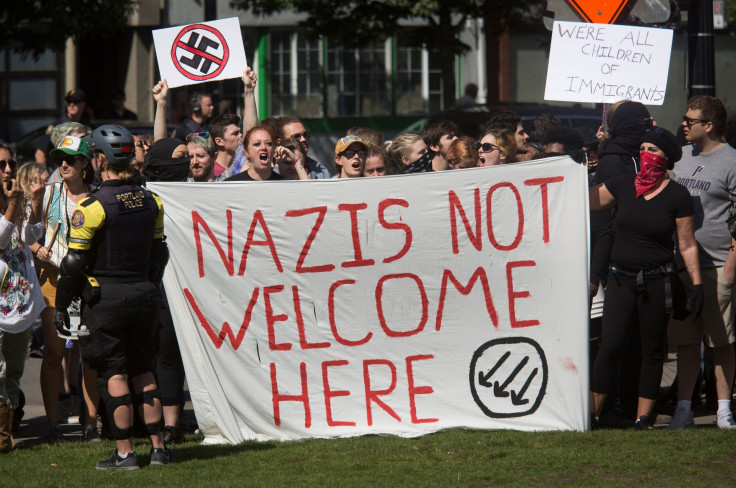Portland Riots: Antifa, Patriot Prayer Protesters Clash Violently, 4 Arrested [Photos, Videos]

Opposing protest rallies in Portland, Oregon, turned violent Sunday, leading to multiple arrests after an anti-fascist group, more commonly known as Antifa, clashed with the far right-wing group Patriot Prayer — which was reminiscent of a similar situation last year which had led to 14 people getting arrested.
The protests started peacefully when an anti-police brutality rally organized by Direct Action Alliance and Empower Portland, began at 2 p.m. local time (5 p.m. EDT) at Chapman Square. It was only when Patriot Prayer, who had dubbed their rally "Tiny's Freedom March," as a tribute to Tusitala John Toese — a close associate of their group leader Joey Gibson — who is leaving Oregon, started their march before their scheduled time of 5 p.m. local time (8 p.m. EDT) that things started getting violent.
The Rose City Antifa had scheduled their protest march for 4 p.m. local time (7 p.m. EDT) "to show Patriot Prayer, just as we showed them last year, that their violence and hatred has no place in Portland."
As the two protests clashed, violent brawls erupted between the members of the two groups. The police arrived at the scene shortly after the assaults started and arrested four people — two from each protest group — and carried them away in zip-ties. Photos and videos of the violence were uploaded on social media:
Things are starting to get violent downtown at the protests. Police in riot gear just arrived. pic.twitter.com/PmrftEqipl
— Lindsay Nadrich (@LindsayNadrich) June 3, 2018
Breaking: Beatdowns at the Patriot Prayer and counterprotest in downtown Portland. Intense video pic.twitter.com/T2H6FveIbb
— Michael (@michaelbivins44) June 3, 2018
More footage from the scuffle in downtown Portland. This happened just after some folks, including Joey Gibson associate "Tiny," showed up at Terry Schrunk Plaza. pic.twitter.com/NGUL59FCAD
— Jim Ryan (@Jimryan015) June 3, 2018
That man, whose face was busted open when I got here, was wearing a Rasheed Wallace jersey pic.twitter.com/2Uh6X8XlWP
— Michael (@michaelbivins44) June 3, 2018
Another fight at the patriot prayer rally. Pepper spray deployed. pic.twitter.com/Hpx5hDERzV
— Michael (@michaelbivins44) June 3, 2018
From what I observed a black-clad protester was seen attempting to produce something from a backpack and police pounced. Unclear if this is an arrest pic.twitter.com/0w8oDpBx1U
— Michael (@michaelbivins44) June 3, 2018
This man was arrested by DHS police and taken into the federal building. Shouting “I’m compliant” pic.twitter.com/G5RZBg7X4S
— Michael (@michaelbivins44) June 3, 2018
Another wild brawl at 5th by city hall. This stuff is craaaaazy. Violent as all hell pic.twitter.com/cKNeSc1eGJ
— Michael (@michaelbivins44) June 3, 2018
More pepper spray. Both sides are using it. pic.twitter.com/uA560smN1O
— Bisexual Reporter Kelly Kenoyer🏳️🌈 (@Kelly_Kenoyer) June 4, 2018
“Officers have observed participants at today’s events at Terry Schrunk Plaza and Chapman and Lownsdale Square participate in assaultive behavior,” tweeted the Portland police.
In a press release prior to the planned marches, the police had warned participants to refrain from bringing any kind of weapons to the multiple rallies that were expected to take place in front of Terry Schrunk Plaza Chapman and Lownsdale Square.
“Due to the potential for violence, persons attending any of the events are discouraged from bringing any weapons (firearms, knives, etc.) or items that can be used as weapons (sticks, bats, poles, rocks, fireworks/incendiary devices, etc.) to any of the events. Prohibited items may be seized by police and, if in violation of city, state or federal law, the possessor may be arrested and charged criminally,” the press release stated.
However, regardless of the warning, the police posted pictures of some violent weapons seized from members of the protest rallies. Both of the groups carried pepper sprays, rocks and other small weapons which they used on each other.
Officers continue to observe people participating in violent behavior. Weapons have been confiscated from protesters. Fireworks and bottles have been thrown at officers and participants. pic.twitter.com/SKLf85CDLK
— Portland Police (@PortlandPolice) June 4, 2018
Four People Arrested During Sunday Afternoon Protests (Photo) https://t.co/0hhPYtLBW2 pic.twitter.com/kgFZqGKNlP
— Portland Police (@PortlandPolice) June 4, 2018
As the violence progressed from the sidewalk to the streets, the police warned citizens to stay away from the area.
“If you are in the immediate area of competing protest events in Downtown Portland, you are at risk of getting caught in between violent clashes and any law enforcement actions or arrests. You are advised to leave the area,” the Portland Police tweeted.
The police also used a sound truck to warn protesters to return to the sidewalk or risk getting arrested.
The Sound Truck has announced multiple times: pic.twitter.com/iz06VboXoK
— Portland Police (@PortlandPolice) June 4, 2018
By evening, the police had managed to significantly put an end to the violent brawls and physical assaults between the two groups, keeping them separate as they marched around the block before resuming their positions at the opposite end of the street. They, however, continued yelling abuses at each other.
"The intent of our presence today was to provide a safe environment for all participants, non-participants, and community members while ensuring the peaceful exercise of the First Amendment," said Portland Police Chief Danielle Outlaw. "The Police Bureau attempted to communicate directly with group organizers through the use of social media, a loud-hailer, and person-to-person communication in an effort to encourage an environment in which Portland community members could safely practice their right to free speech and assembly. Bureau members attempted to intercede by separating and arresting people on occasions when people's safety were in jeopardy."
© Copyright IBTimes 2025. All rights reserved.






















